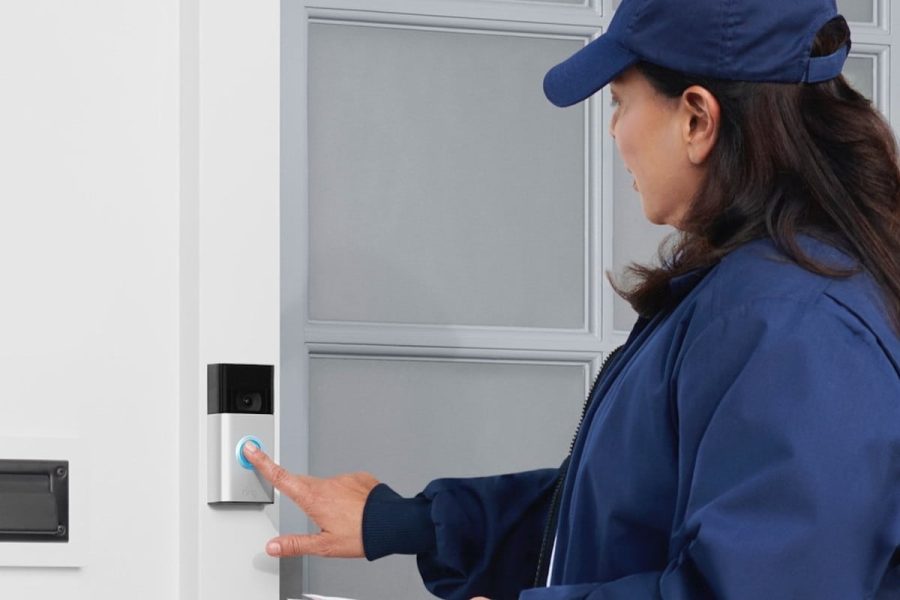Surveillance Cameras Prompt Privacy Concerns
Indoor surveillance cameras and outdoor Ring doorbell cameras are increasing in popularity across the United States. While I think that surveillance cameras like Ring doorbell cameras have positive effects in deterring some minor crimes and aiding police investigations, people should also be made more aware of the direction surveillance camera technology may be headed in and the consequences that can arise from it.
Although I don’t have a Ring doorbell camera, I do have surveillance cameras in my home, and this is common throughout my neighborhood. When someone crashed into a neighbor’s car at night, it was surveillance cameras that helped determine what happened. Surveillance cameras inspire feelings of safety and security. There is also a sense that you are being proactive in preventing a crime from occuring, or in the worst case, that you at least have recorded footage in order to aid in investigations when a crime is not preventable. This is a widely-held chain of thought. Research has shown that surveillance cameras like closed-circuit television (CCTV), which is installed in cities, reduce minor crimes like car burglaries and property theft, but they have little impact on deterring more violent crimes.
While there are some positive effects of home surveillance cameras, there are also some privacy issues to consider. Although the technology to access live footage hasn’t been created yet, in San Francisco, there is a new ordinance allowing police officers to temporarily access live footage of cameras not owned by the city.
Surveillance footage from home cameras has been posted on various apps such as the Neighbors app and the Citizens app. Police officers can request footage from Ring doorbell users. Amazon has also sent out Ring camera footage to police officers “without notification or warrants,” and worked with the police to promote Amazon products in a quid pro quo situation.
Additionally, home surveillance cameras have also contributed to an increasing culture of people watching each other, which is dangerous to normalize. Amazon Ring sends notifications to your device, akin to social media, which grabs your attention. Amazon even has a TV show where viral or comedic camera footage is shown, further normalizing the idea of people watching others. Delivery workers have also been affected as their falls and accidents are surveilled and recorded, contributing to their humiliation.
There have also been safety concerns regarding home surveillance cameras since they can easily be hacked into. In one incident, Amazon Ring detected what was thought to be a threat but was really a neighbor returning a package, and then sent out a notification that prompted the owners to retrieve their handguns and shoot. Although no one was hurt, this incident shows how Ring technology can be defective and go in the complete opposite direction of their goal of safety. Additionally, in Ring’s complement app Neighbors, people of color are often listed more as suspicious, which promotes racial bias.
Surveillance cameras and Ring doorbell cameras are so common in today’s world. I’ve even seen comedic videos on the Internet of people’s failures or unusual happenings which were recorded on home surveillance cameras. Learning more about how home surveillance cameras can invade your privacy or the privacy of others gives me something to think about in regards to getting or using something like a Ring doorbell camera.
Other than a more balanced point of view concerning privacy, learning about home surveillance also makes me think more about its relationship to deterring crime. While home surveillance and general surveillance can be beneficial for individuals, their families and neighbors, they should not be thought of as the only solution for crime deterrent, especially since they are not as effective in preventing violent crimes.
More effective methods which infringe less on privacy and can target reduction of violent crimes include adding new streetlights in neighborhoods where violent crime is more familiar. In one study, it was found that adding new street lights reduced “serious felony crimes that includes murder, robbery and aggravated assault, as well as certain property crimes.” Perhaps the concept of reducing crime should not be left up to residents, and instead should be pushed by city and town representatives.
Overall, while home surveillance and Ring doorbell cameras do offer benefits in making people feel safer, deterring small crimes and aiding in investigations, it is also important to consider how they may invade your privacy along with the privacy of others. In a culture where surveilling and people-watching is becoming more common, it is important to find the distinction between safety and privacy. The next time you consider getting home surveillance or a doorbell camera, balance the positives alongside your need for privacy.
Saisha Islam, FCRH ’25, is a biology major from New York, N.Y.

Saisha Islam is a senior from the Bronx, N.Y., who is majoring in biological sciences and minoring in English. She first joined The Fordham Ram as a contributing...










































































































































































































